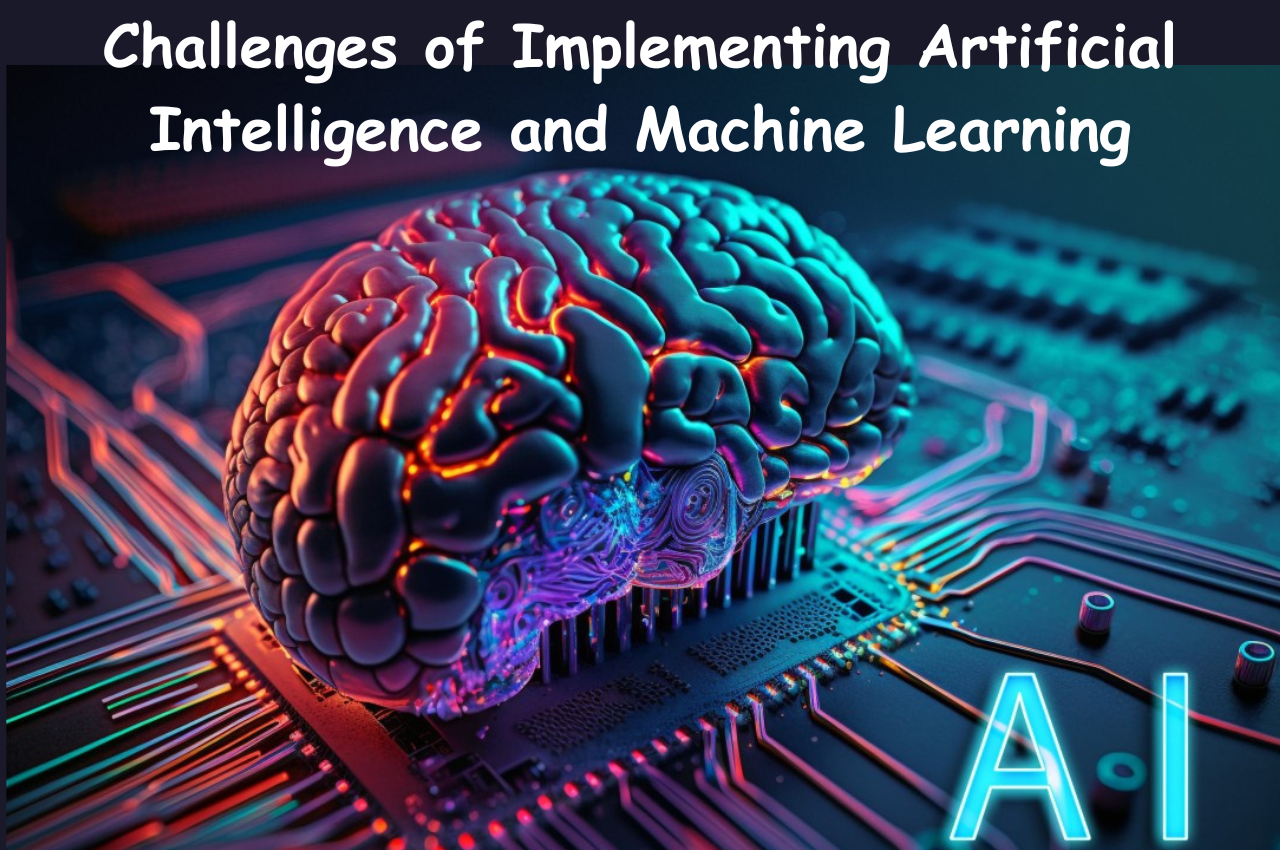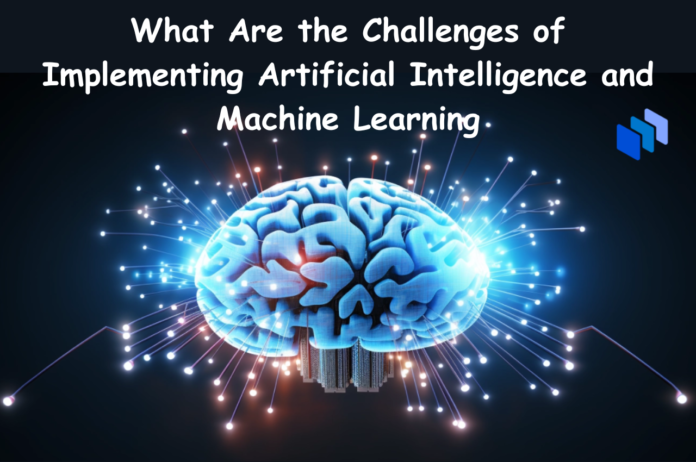If you are thinking about the challenges of implementing artificial intelligence and machine learning then today’s article is for you. Machine learning plays an important role in every aspect of our daily life. The global machine learning market is expected to grow significantly in recent times, thereby increasing the demand for professionals in this field. In today’s article we will discuss, what are the challenges of implementing artificial intelligence and machine learning. Let’s begin-
Thank you for reading this post, don't forget to subscribe!Overview of AI and ML
Artificial intelligence (AI) and machine learning (ML) are closely related fields that have received significant attention and progress in recent years.
Artificial Intelligence (AI)
AI refers to the imitation of human intelligence processes by machines, especially computer systems, which encompasses various subfields including natural language processing, expert systems, robotics, computer vision, and more. AI systems aim to mimic human cognitive functions such as learning, problem solving, perception, reasoning and decision making. It can be classified into two types: narrow AI (or weak AI) and general AI (or strong AI). Narrow AI focuses on performing specific tasks, while general AI refers to systems that can understand, learn, and apply knowledge to a wide range of tasks similar to human intelligence.
Machine Learning (ML)
ML is a subset of AI that focuses on developing algorithms that allow computers to learn and make predictions or decisions based on data. Instead of explicitly programmed instructions, ML algorithms use statistical techniques to enable computers to learn patterns and insights from data. ML algorithms can be classified into three main types: supervised learning, unsupervised learning, and reinforcement learning. In supervised learning, the algorithm learns from labeled data, where each input is tagged with the correct output. Reinforcement learning trains an algorithm to make a sequence of decisions. Algorithms learn through trial and error, receiving feedback in the form of rewards or penalties.
Importance of AI and ML in Real World
AI and ML are important in the real world because they:
- Addresses complex challenges with advanced computational capabilities.
- Enhance efficiency and save time by automating tasks.
- Analyzes data to make valuable insights and well-informed decisions.
- Predict future trends and outcomes for better planning.
- Personalize experiences to improve User Satisfaction.
- Revolutionize healthcare with accurate diagnostics and personalized treatments.
- Enhance security measures and risk management.
- Drive innovation and economic growth.
What Are the Challenges of Implementing Artificial Intelligence and Machine Learning?
Artificial intelligence and machine learning provide the ability for computers to gain knowledge from data and make intelligent decisions, which has both advantages and disadvantages.  However, the challenges of implementing artificial intelligence and machine learning are described below:
However, the challenges of implementing artificial intelligence and machine learning are described below:
Low-quality data
Data plays a critical role in the journey of machine learning. Dealing with low-quality data poses a significant challenge, which can greatly hinder the entire process. In order to prevent inaccurate or flawed predictions generated by algorithms, it is essential to prioritize the use of high-quality data. This emphasizes the importance of executing the data preprocessing phase meticulously, which includes tasks such as filtering out missing values and eliminating unnecessary features.
Clarity and Comprehensibility
As machine learning models advance, their complex inner mechanisms can result in a lack of transparency. This lack of transparency can erode trust and give rise to worries about fairness, accountability, and bias. It is essential to devise methods to improve the interpretability and openness of machine learning models in order to guarantee ethical and accountable implementation.
Scalability and Limited Resources
Deploying machine learning frameworks at a large scale can pose difficulties because of limitations in resources. Training complex models demands substantial computational power and storage capacities. Particularly for small enterprises, the expenses associated with expanding and upkeeping infrastructure become a critical factor. These obstacles can be alleviated by effective resource management and investigating cloud-based options.
Insufficient Training Data
It is essential to properly train the data in order to achieve accurate results. Insufficient training data can result in inaccurate or biased predictions. Machine learning algorithms require a large amount of data to effectively learn, especially for complex issues. Therefore, ensuring that these algorithms have an adequate amount of data for training is crucial.
Algorithm Challenges with Growing Data
After obtaining high-quality data and refining the training process, reaching precise predictions can be very rewarding. However, as the dataset expands, the model’s effectiveness may diminish over time. It is essential to anticipate that today’s accurate model may require modifications in the future. Consistent monitoring and upkeep are vital to ensure the algorithm remains operational, posing a significant challenge for professionals in the field of machine learning.
More Info: Implement Artificial Intelligence and Machine Learning in Your Business
Machine learning is revolutionizing technology rapidly, being applied in diverse fields such as healthcare and personalized recommendations. While it presents lucrative job prospects and competitive salaries, it also brings forth obstacles. Prior to embarking on any project, having a well-thought-out strategy and exercising patience are key components to success.
Solutions for Successful Implementation of AI and ML Applications
To overcome the challenges discussed above and ensure successful implementation of AI and ML in real-world applications, several solutions can be adopted, which are mentioned below:
- Establish data governance frameworks to ensure data quality, privacy, and ethical use.
- Investing in research and development to increase interpretability, interpretability and fairness in AI and ML algorithms.
- Building scalable and efficient computing infrastructure to support large-scale deployment of AI and ML systems.
- Regulatory bodies need to be motivated to develop guidelines and policies, which promote the ethical and responsible use of AI and ML.
- Providing education and training to users and stakeholders to increase understanding and acceptance of AI and ML technologies.
- Promote interdisciplinary collaborations to address complex challenges and incorporate diverse perspectives.
Final Words
The successful implementation of artificial intelligence and machine learning in real-world applications holds tremendous potential to transform industries and improve many aspects of our lives. However, solutions must prioritize data-related challenges, ethics, interpretability, scalability, integration, bias, user acceptance, continuous learning, security, and privacy. By considering acceptable solutions and taking a multidisciplinary approach, we can unlock the full benefits of AI and ML and ensure their responsible and effective use. In today’s talk on Technocommy, what are the challenges of implementing artificial intelligence and machine learning? The points mentioned above must have given you a clear idea about it. If you are still facing the same challenges in implementing AI and ML applications, make sure you read our news and articles and contact us!


